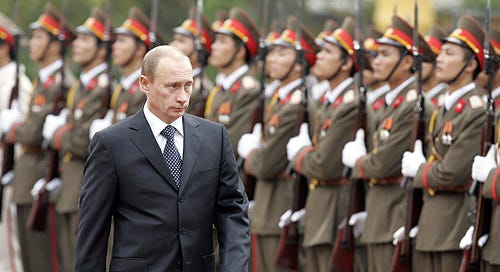Putin In Hanoi
Why an earth did Vietnam agree to welcome Putin? And is there an information problem in Hanoi?
By the time this newsletter goes live, Vladimir Putin, the Russian president, will have probably woken up, showered, and be ready to board his flight from North Korea to Vietnam.
I’ll try to keep this short. First, I simply cannot understand why Hanoi agreed to welcome Putin. I understand why Hanoi has welcomed Russian ministers, like Sergey Lavrov. I understand why Hanoi invited Putin. I understand why last month, with Putin in Beijing, Hanoi got jittery about Putin actually visiting and called it off, using the political turmoil within the Vietnamese Communist Party at the time as an excuse. The Vietnamese government does want to maintain military relations with Russia, which was the largest provider of military arms to Vietnam prior to 2022. Obviously, Russia has spent down almost its entire arsenal in Ukraine, and nobody should be sitting in Hanoi watching how badly Russian equipment is faring and thinking, “I must have some of that.” Vietnam is also a major user of artificial fertilizer (the second largest per hectare in Southeast Asia), and Russia and Belarus are among the main producers of most fertilizers—so there’s that. There’s probably also some dodgy business both sides want to discuss. And Vietnam is desperate to tell everyone that it’s a friend to all and a vassal of none, so this is a way for Hanoi to say to Washington, “you can’t tell us who we can meet with.” That’s important because some in Washington and Beijing now regard Vietnam as ally-adjacent to the US, which isn’t true and which Hanoi really, really, really doesn’t want China to believe.
BUT…all of this could have been achieved without unfurling the red carpet for Putin. Vietnam could have just welcomed only Russia’s new defense minister this week, and it would have had all the upsides and none of the downsides. That might have been seen as a snub by Putin, but Russia has a lot more to gain from Vietnam than vice-versa. Washington and Brussels have shown up to now that they will ignore Russian ministers visiting Hanoi; it’s different when it’s the butcher himself.
Now, the implications for Europe. I don’t see why the US or EU responding punitively. Of course, they’ll make it clear that they condemn anyone who meets with Putin. Washington and Brussels will take this as an insult from Vietnam—which it is; Hanoi has to play grown-up geopolitics and cannot get away with “what me?” ignorance about what’s at stake for the West with the Ukraine war. Maybe Washington and Brussels give a freer hand to those who want to hold Vietnam to account for currency manipulation, product dumping, and allowing China to circumvent tariffs. However, the response from Washington and Brussels will be largely symbolic. They will pose the question about Vietnam’s affinity to international law, a touchy subject since this is what Hanoi uses to oppose Chinese aggression in the South China Sea. More importantly, it will finally awaken some in Europe to the fact that the Vietnamese Communist Party is not a pro-Western ally or an authoritarian-lite government but is actually one of the most repressive regimes in Asia (increasingly so in recent years) that is engaging in the West because it has to.
The fact that Hanoi decided to welcome Putin when it knew it could have gotten what it wanted without him showing up shows that the Vietnamese government isn’t in a corner in this decision. It’s calculated; Hanoi thought long and hard about it, but it decided that it was worth the risks, so it cast the die.
Indeed, what Europeans, and certainly European investors, should be looking at is how this decision was made. I’ll hazard a counterfactual: this visit doesn’t happen without the purges we’ve seen within the Communist Party over the past twelve months. Put differently, this wouldn’t have gone ahead had the securocrats not taken over. There are now two, at most three, “technocrats” left within the Politburo after last month’s influx. None have senior positions. Because it’s been relatively slow, and because it’s been framed around anti-corruption, it’s been easy to miss a putsch by the military and public security ministry, which are now the dominant factions within the party. To Lam, the new state president and former security minister, is likely to become the next party chief.
What should be of concern is who these people are listening to and whether the information flow within the party, from the experts in the ministries and party committees to the senior leadership, has been affected by the anti-graft campaign. We know it has had an impact on decision-making in the bureaucracy; no civil servant wants to make tough decisions because they don’t want to be blamed and fired or worse, so key decisions aren’t being made. That’s been a drag on the economy.
What we should also look for is whether there is now an information problem. Are the people at the top being given honest, accurate, and perhaps unwelcome information? Are they willing to listen to unwelcome opinions from their underlings and, importantly, from people outside their factions? I don’t see how Putin’s visit would go ahead if the economic-minded “technocrats” were still a powerful faction. I do see how it goes ahead if the securocrats now in charge are refusing to listen (or be given) information about what could be the negative consequences of the visit. I’m not saying there is an information problem within Vietnam like there is in China—where Xi Jinping has purged so many people that honest and unwelcome information is simply no longer relayed to him. But this should be a concern for investors and European governments moving forward, especially because it seems the securocrats haven’t given up purging their rivals and after the National Congress in 2026, they’ll be in an even stronger position.


